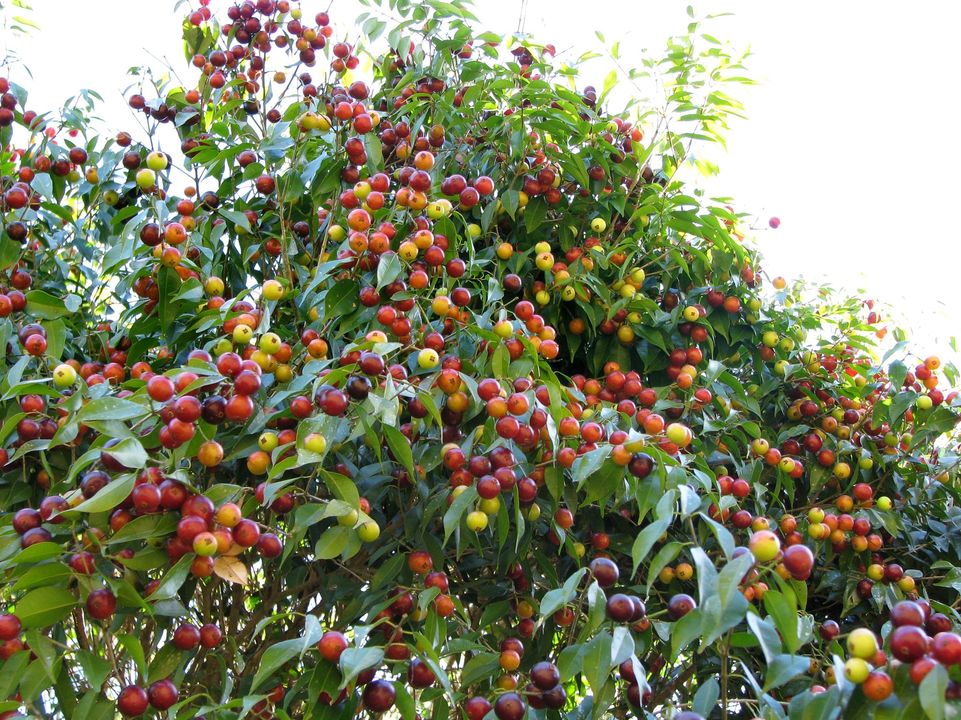Guaburiti (Plinia rivularis) - 1 fresh seed / 1 frischer Samen
Product number:
EI12177
product information "Guaburiti (Plinia rivularis) - 1 fresh seed / 1 frischer Samen"
Guaburiti - Plinia rivularis
Family / Familie: Myrtaceae
origin from / Herkunft: Südamerika / South America
Climate / Klima: temperate to warm (10-30C / 50-86F) / gemäßigt bis warm (10-30C / 50-86F)
Use / Verwendung: edible fruits, juice, jam, ice cream, etc. / essbare Früchte, Säfte, Marmelade, Eis usw.
you buy / sie kaufen: 1 fresh seed / 1 frischer Samen
Family / Familie: Myrtaceae
origin from / Herkunft: Südamerika / South America
Climate / Klima: temperate to warm (10-30C / 50-86F) / gemäßigt bis warm (10-30C / 50-86F)
Use / Verwendung: edible fruits, juice, jam, ice cream, etc. / essbare Früchte, Säfte, Marmelade, Eis usw.
you buy / sie kaufen: 1 fresh seed / 1 frischer Samen
Delivery worldwide
There's a Jaboticaba tree that, quite atypically, doesn't bear its fruit directly on the main stem, but rather in bunches on the branches.
Guaburiti (Plinia rivularis)
No matter where you read or talk, everyone says that this fruit not only tastes good, but "very good."
The flavor is reminiscent of Jaboticaba with a mix of mango, passion fruit, peach, and clove, and the flesh is very juicy.
This rare tree originates from southern Brazil and is also found in northern Argentina and small parts of Paraguay.
It tolerates short-term frosts down to -4 degrees Celsius and browns leaf tips less frequently than other Plinias.
The tree doesn't grow very large and is very well suited to container cultivation.
Guaburiti prefers sunny and partially shaded locations, deep, well-drained soil, and eventually produces prolific fruit.
By the way: The Latin word "rivularis" means "near a river" or "near a river" and refers to the first location where this wonderful Plinia was found.
Please overwinter at a minimum temperature of 10 degrees Celsius.
Es gibt eine Jaboticaba die völlig untypisch ihre Früchte nicht direkt am Hauptstamm bekommt, sondern bündelweise an den Ästen.
Guaburiti (Plinia rivularis)
Egal wo man liest oder sich unterhält: alle sagen, dass diese Frucht nicht nur gut schmeckt, sondern "sehr gut".
Der Geschmack erinnert an Jaboticaba mit einem Mix von Mango, Maracuja, Pfirsisch und Gewürznelke und das Fruchtfleisch ist sehr saftig.
Dieser seltene Baum stammt aus dem Süden Brasiliens und kommt auch im Norden Argentiniens und kleinen Teilen in Paraguay vor.
Er verträgt kurzfristige Fröste bis -4 Grad und bekommt seltener braune Blattspitzen als andere Plinias.
Der Baum wird nicht sehr groß und ist sehr gut für eine Kübelhaltung geeignet.
Guaburiti mag sonnige und halbschattige Plätze, einen tiefen, durchlässigen Boden und produziert später einmal Unmengen an Früchten.
Übrigens: das lateinische Wort "rivularis" bedeutet "flussnah" bzw. "in der Nähe eines Flusses" und bezieht sich auf den damaligen ersten Fundort dieser tollen Plinia.
Überwintern bitte bei mindestens 10 Grad.
There's a Jaboticaba tree that, quite atypically, doesn't bear its fruit directly on the main stem, but rather in bunches on the branches.
Guaburiti (Plinia rivularis)
No matter where you read or talk, everyone says that this fruit not only tastes good, but "very good."
The flavor is reminiscent of Jaboticaba with a mix of mango, passion fruit, peach, and clove, and the flesh is very juicy.
This rare tree originates from southern Brazil and is also found in northern Argentina and small parts of Paraguay.
It tolerates short-term frosts down to -4 degrees Celsius and browns leaf tips less frequently than other Plinias.
The tree doesn't grow very large and is very well suited to container cultivation.
Guaburiti prefers sunny and partially shaded locations, deep, well-drained soil, and eventually produces prolific fruit.
By the way: The Latin word "rivularis" means "near a river" or "near a river" and refers to the first location where this wonderful Plinia was found.
Please overwinter at a minimum temperature of 10 degrees Celsius.
Es gibt eine Jaboticaba die völlig untypisch ihre Früchte nicht direkt am Hauptstamm bekommt, sondern bündelweise an den Ästen.
Guaburiti (Plinia rivularis)
Egal wo man liest oder sich unterhält: alle sagen, dass diese Frucht nicht nur gut schmeckt, sondern "sehr gut".
Der Geschmack erinnert an Jaboticaba mit einem Mix von Mango, Maracuja, Pfirsisch und Gewürznelke und das Fruchtfleisch ist sehr saftig.
Dieser seltene Baum stammt aus dem Süden Brasiliens und kommt auch im Norden Argentiniens und kleinen Teilen in Paraguay vor.
Er verträgt kurzfristige Fröste bis -4 Grad und bekommt seltener braune Blattspitzen als andere Plinias.
Der Baum wird nicht sehr groß und ist sehr gut für eine Kübelhaltung geeignet.
Guaburiti mag sonnige und halbschattige Plätze, einen tiefen, durchlässigen Boden und produziert später einmal Unmengen an Früchten.
Übrigens: das lateinische Wort "rivularis" bedeutet "flussnah" bzw. "in der Nähe eines Flusses" und bezieht sich auf den damaligen ersten Fundort dieser tollen Plinia.
Überwintern bitte bei mindestens 10 Grad.








